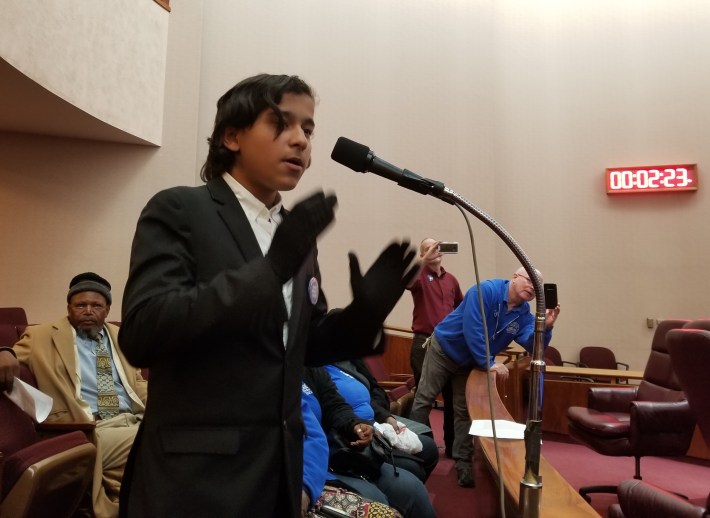The proposal for an all-affordable, seven-story 100-unit transit-oriented development to replace the Emmett Street parking lot next to the Logan Square Blue Line station, which was overwhelmingly approved by local residents at a community meeting this spring, got some important approvals from the Chicago Plan Commission today at City Hall. But the project also received some criticism at the hearing from neighbors who have bitterly fought against the plan to help mitigate housing displacement in the gentrifying neighborhood and provide better transit access for lower-income and working-class residents.
In the spring, a group of property owners who live on or near Emmett, including an architect, a real estate agent, attorneys, and a landlord, formed the group Logan Square Neighbors for Responsible Development to oppose the current plans for the development. They called for a shorter building with more parking and open space, changes that would have greatly decrease the number of affordable units.
During today's meeting, opponents testified that while the parking lot currently gets relatively little use, more signage could attract additional users – implying that parking more cars would be a better use for the land than the 100 units of affordable housing. Some of them argued that, while Chicago is in an affordable housing crisis, the land is too valuable to use for affordable housing.
Proponents noted that while the naysayers talked about the value of the city-owned parking lot, but they didn't acknowledge the value of bringing more affordable housing to Logan Square. They pointed out that while the parking lot supports few jobs, the TOD, which will include retail storefronts, will create many temporary and permanent positions. Miguel Kilgore, 12, the son of Michael Burton, a staffer at the Bickerdike Redevelopment Corporation, the nonprofit developer, testified, "I want to know that people, no matter what their income, can live in Logan Square."

Plan Commission member 27th Ward Alderman Walter Burnett voiced support for the project, calling it a great use of city-owned property. The development is projected to cost about $31 million, and Bickerdike hopes to line up the financing by using subsidies like low-income tax credits and tax-increment financing money.
After a motion passed to authorize the disposition of the city-owned land to Bickerdike, commission member 44th Ward Alderman Tom Tunney said he wanted more information on the value of the Emmett property. A staffer in the Chicago Department of Planning and Development responded that there will be an appraisal prior to hearings on the project by the city's Community Development Commission and the City Council's Housing Committee.
Burnett noted that if this was not a city-owned property, the city would need to spend more money to purchase the land in order to build affordable housing on it. He argued that the more a property is worth, the more valuable it is to devote the land to affordable housing.
Recently appointed Department of Housing commissioner Marisa Novara, formerly vice president of the Metropolitan Planning Council, testified that her department supports the project because "the city values people over cars." In the end, the Plan Commission unanimously approved the project, which drew thunderous applause from the crowd.
In addition to being heard at the Community Development Commission and the Housing Committee, other hurdles the affordable TOD project needs to clear before it becomes a reality include the Zoning Committee (for the Planned Development zoning change), the Finance Committee (for approval of the TIF funding), and then the full City Council. We'll keep you posted on new developments as the plan progresses.




